Book Review: Stone Blind: Medusa's Story by Natalie Haynes
My Rating:⭐⭐⭐⭐
“I’m wondering if you still think of her as a monster. I suppose it depends on what you think that word means. Monsters are, what? Ugly? Terrifying? Gorgons are both these things, certainly, although Medusa wasn’t always. Can a monster be beautiful if it is still terrifying? Perhaps it depends on how you experience fear and judge beauty.”
The mortal daughter of the sea god Phorcys and Ceto, Medusa is raised by her Gorgon sisters, Sthenno, who treats her as if she were her own child, and Euryale who loves her no less. (”we are one, but we are many”). She leads a sheltered life under the loving care of her sisters for sixteen years until she becomes the object of desire of Poseidon who violates her in the temple of Athene. Athene’s rage manifests in the form of a curse. Overnight, Medusa transforms into a Gorgon – anguished not only by the painful physical transformation but also unable to look at any living creature without it turning to stone. Her transformation into a Gorgon also lands her in the path of Perseus who is on a quest to capture the head of a Gorgon, not without the assistance of Goddess Athene, Hermes, and others who arm him with whatever he would require to complete his quest successfully.
Multiple characters (gods, demigods, nymphs, mortals and even a talkative crow) take us through the events that lead to Perseus’ encounter with the Gorgons and beyond. My only complaint is we don’t get much of Medusa’s own voice telling her story (which is what I was expecting.) Though Medusa or rather Medusa’s head does share her PoV, her voice felt overshadowed by that of Athene. I loved how the author describes Medusa’s childhood years and her relationship with her sisters. Medusa’a story is a sad one he did not deserve the treatment she reeved- from Poseidon, Athene or Perseus. Not only does Natalie Haynes do a brilliant job in voicing her innocence, helplessness and fear as a wronged young girl-turned-Gorgon but she also packs a powerful punch in voicing her rage after being decapitated when her head takes over Medusa’s narrative. Natalie Haynes balances the tragic element of the story with her signature sardonic humor and wit. I enjoyed the stories of the gods and their insecurities and pettiness (Hera and Zeus never fail to entertain). We also get to know the story of Athene’s origins, the Gigantomachy and the story of Perseus and Andromeda. Much of the narrative focuses on Perseus (his conception, his quest and the aftermath). In keeping with the strong feminist overtones of Natalie Haynes’ mythological retellings, the author holds nothing back in her portrayal of Perseus “as arrogant and spoiled”.
“He is a vicious little thug and the sooner you grasp that, and stop thinking of him as a brave boy hero, the closer you’ll be to understanding what actually happened.”
Despite the multiple perspectives, the narrative is well structured, flows seamlessly and the pacing is consistent. The author provides a list of characters at the beginning of the book which makes it easy to place the characters, the varying timelines and the role they play in Medusa’s story. Those who follow Greek mythology might be a tad disappointed that the author chose to leave out a few details from Medusa’s story, which would have added a bit of depth to Medusa’s narrative but overall this is an absorbing read. Natalie Haynes is a masterful storyteller and her prose is exquisite. Having enjoyed both Pandora’s Jar and A Thousand Ships by Natalie Haynes I could not wait to pick up her latest offering. I was thrilled when I found out that her new novel would be based on Medusa, a character whose story has always fascinated me. I promptly pre-ordered my copy of Stone Blind: Medusa’s Story from the UK and I must mention that this beautiful edition is a worthy addition to my personal collection!

Comments
Post a Comment